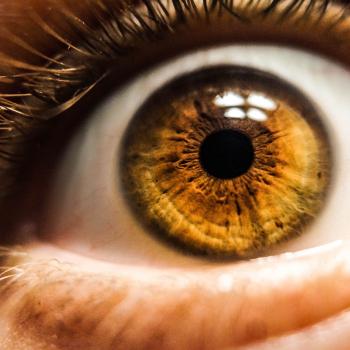
Have you heard of “the shimmer”? It’s a term coined by the life philosopher and dharma artist Erick Godsey to describe our unhealthy attraction to our smartphones, or any screen that sucks us into the Internet.
Godsey, whose ideas are rooted in mythology, didn’t exactly invent “the shimmer.” He borrowed it from the 2018 science fiction movie Annihilation. In that film, the shimmer is (as reported by Wikipedia) “a mysterious quarantined zone of mutating plants and animals caused by an alien presence.” But the truly scary part is that the shimmer “distorts and transforms everything that falls within its boundaries,” including the DNA of humans, causing us to self-destruct.
In the online video Mastering the Shimmer, and on podcasts and blogposts, Godsey makes the case that the shimmer is living amongst us today—radically changing who we are as people, what we do and how we act. And not in a good way.
“We live in a new world … this is something never seen before.”
Godsey sees the emergence of the digital world as one of the most significant moments in the history of the universe—right up there with humans learning how to write and the invention of the printing press. But the Internet may be even more powerful, as it now connects virtually every person in the world.
It’s a huge paradigm shift and it may seem like progress. After all, we now walk through life with a supercomputer, aka a smartphone, in the palm of our hands. We literally have a world of information right at our fingertips. But as Godsey points out, “instead of using the Internet, the Internet has begun using us.” Consider these facts:
- We now check our phones an average of 144 times a day (for 18- to 34-year-olds, estimates run as high as 200 times a day)
- On average, we look at our phones once every 4.9 minutes
- We spend about four and a half hours a day on our phones
The problem with all this time devoted to looking at our phones? Aside from the damage it does to our souls, our attention has begun to fragment. As Godsey says, we’ve become so distracted, that “we don’t know we’re drowning.” We’re less able to focus on the tasks in front of us or complete them in a timely manner. We’re also far less present to those around us and right in front of us.
It’s even worse for the young people in our lives. In the book The Anxious Generation: How the Great Rewiring of Childhood is Causing an Epidemic of Mental Illness, Jonathan Haidt calls smartphones and social media “the largest uncontrolled experiment humanity has ever performed on its own children.” His take: “the experiment has been a disaster.”
Are advances in social media apps to be blamed?
On a short discourse on the Waking Up app, host Sam Harris explains the problem: Social media platforms are using algorithms that rule our attention, by exploiting emotions like desire, fear, and outrage. When we click on these attention-grabbing posts, the algorithms give us more of the same. More desire. More fear. More outrage. This snares us in an endless loop of manipulation and is bad for everyone involved, especially our youth.
Godsey reports that depression among teens had gone up almost 250% in the past 10 years. Measurements of everything from anorexia to ADHD to anxiety are all way up. And if you think the new generation is just more open to talking about their mental health issues, data shows there more to it than that. Emergency-room visits for self-inflicted injuries, including suicide attempts, are up over 100% in the past decade
The good news is the shimmer doesn’t have to win.
The shimmer isn’t going away but there is a person that can beat it. You. As Sam Harris explains, you can do this because “you have the ability to choose what things you pay attention to.” It starts with being alert to what you’re doing and not mindlessly grabbing for your phone every 4.9 minutes.
To fix your own attention deficit, be aware of what’s happening. Godsey believes that attention is a skill, and you need to train it “like an athlete.” That starts by managing your phone, instead of letting it manage you. Here are a few tips:
- Don’t allow social media apps to send you push notifications like text message alerts. Go into your settings and turn them off.
- Quarantine your social media apps. Put them in a folder where they’re not easily accessible and it takes more than a single clip to reach them.
- Block your time. Only allow yourself to access social media at certain times during the day.
What will you do with all the extra time you have by spending less time on the phone? If you haven’t already, start a practice that improves your mental, physical, and spiritual well-being. Godsey has some ideas and I’ve added a few of my own: Meditate. Exercise. Pray. Eat healthy. Go outside. Keep a notebook where you can jot down your thoughts and dreams. Make a contribution to the world, be it sharing your art or your humanity.
The shimmer isn’t going away. It’s here to stay. But by being a little more mindful of your actions and how you fill your days, you can do more than deal with it. You can thrive despite it.
If you like this story, check out my book Wake Up Call: Daily Insights for the Spiritually Curious.

















